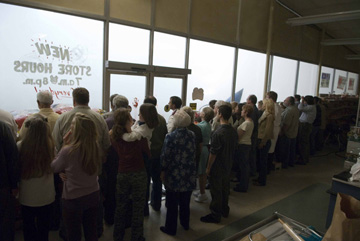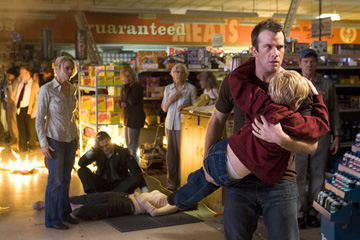On October 26, 2001, Dennis Loy Johnson reported on the Franzen fiasco:

Three days later in an interview on National Public Radio’s “Fresh Air” he told host Terry Gross that he was still conflicted about Oprah because — well, “So much of reading is sustained in this country, I think, by the fact that women read while men are off golfing or watching football on TV or playing with their flight simulator or whatever. I worry — I’m sorry that it’s, uh — I had some hope of actually reaching a male audience and I’ve heard more than one reader in signing lines now at bookstores say ‘If I hadn’t heard you, I would have been put off by the fact that it is an Oprah pick. I figure those books are for women. I would never touch it.’ Those are male readers speaking.”
…
Thus does class meet boorish elitism. Franzen, through his publisher, issued an immediate sort–of apology: “I try to explore complicated emotions and circumstances as honestly and fully as I can. This approach can be productive on the page, but clearly hasn’t been helpful in talking to the media, many members of which used the occasion of my book tour to raise questions about Oprah’s Book Club and the supposed divisions among American readers. The conflict is preexisting in the culture, and it landed in my lap because of my good fortune. I’m sorry if, because of my inexperience, I expressed myself poorly or unwisely.”
So, as it turns out, it was Terry Gross’ fault; even though she started off the interview by gushing, “I read your book and I loved it!” and did not press him in the least or follow up on his blatantly chauvanistic take of Oprah’s audience, she was, apparently, out to get Jonathan Franzen . . . a poor, “inexperienced” lad with only two previous books and hundreds of previous interviews and public appearances under his belt.
And here is the quote reported by the Chicago Tribune and the Boston Review.
I remember hearing Franzen’s remarks. But if you go through the Fresh Air archive, you’ll find no trace of the full record, much less any indication that the broadcast was modified. There is, of course, this repeat of the October 15, 2001 interview in question, broadcast on September 6, 2002. But listen to the RealMedia file for this show and you’ll find only this excerpt at the 3:34 mark:
I mean, so much of reading is sustained, I think, by the fact that women read while men are off golfing or watching football on TV. Or, um, you know, playing with their flight simulator or whatever.
After this, we hear Terry Gross ask her next question. The other part of the quote, as reported by Johnson, “I worry — I’m sorry that it’s, uh — I had some hope of actually reaching a male audience and I’ve heard more than one reader in signing lines now at bookstores say ‘If I hadn’t heard you, I would have been put off by the fact that it is an Oprah pick. I figure those books are for women. I would never touch it.’ Those are male readers speaking,” is missing.
If Terry Gross is a journalist, then she has the responsibility to maintain the full record of this conversation, or at least apprise her listeners that the interview was modified. I do not yet know Ms. Gross’s motivations, but if she is willfully allowing her program to be pressured by authors and/or publishers, then it seems to me that the Literarian Award, which purports to “recogniz[e] the important contribution she has made to the world of books — and to our understanding of literature and the writing process — through her probing and intelligent interviews with authors” does not appear to recognize an interviewer who thoroughly probes her subjects. Indeed, the National Book Foundation has honored an ostensible “journalist” who has failed to preserve the historical record.
At the very least, Gross should have observed — both on the September 6, 2002 repeat broadcast and on the NPR page representing the broadcast — that the interview was edited or tampered with.
I have sent an email to Terry Gross asking for clarification on this matter. I will update this story if I learn any additional details.
[UPDATE: It would appear that Gross has a history of pulling punches. An interview with Village Voice reporter Robert I. Friedman was recorded on January 27, 1993, but Fresh Air never aired the interview, because they were looking for a “moderate” voice.]
[UPDATE 2: Terry Gross has responded to my questions.]
 Whatever the circumstances, The Mist may very well be one of the most quietly subversive movies of the year.
Whatever the circumstances, The Mist may very well be one of the most quietly subversive movies of the year.  I was also impressed by the attention to the mist monster ecosystem. Large and beautiful insects affix themselves to the supermarket window, attracted to the glass the way that moths flock to light, only to be snapped up ruthlessly by gargantuan winged beasts. Nothing here is quite what we expect, which is saying a good deal in light of the fact that the story is essentially a familiar one.
I was also impressed by the attention to the mist monster ecosystem. Large and beautiful insects affix themselves to the supermarket window, attracted to the glass the way that moths flock to light, only to be snapped up ruthlessly by gargantuan winged beasts. Nothing here is quite what we expect, which is saying a good deal in light of the fact that the story is essentially a familiar one.